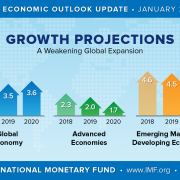Market Volatility – “A Few Minutes with Marcia”
Volatility measures the frequency and magnitude of price movements, both up and down, that a financial instrument experiences over a certain period of time. The more dramatic the price swings, the higher the level of volatility.
Learn the basics of market volatility with Marcia Clark, CFA, MBA.
Watch:
For those who prefer to read!
Welcome to A Few Minutes with Marcia. My name is Marcia Clark, Senior Research Analyst at Warren Street Wealth Advisors. Today we’re going to talk about the 4th quarter 2018 stock market dive and 1st quarter 2019 rebound in an attempt to understand more about market volatility.
Prior to 2018, the stock market had experienced 2 years of unusually low volatility, despite a few bumps along the way. After a mixed start to 2018, the Dow Jones Industrial Average looked like it was back to its winning ways, then came the 4th quarter tumble. Investors were caught by surprise by the huge swings in market prices – volatility – and started selling stocks like crazy. To better understand these market dynamics, let’s put the recent activity into context.
You may have heard of a common measure of market volatility called the ‘VIX’ – the Chicago Board Options Exchange volatility index. The VIX measures expected future volatility by evaluating the prices of put and call options traded on the exchange. If you’re looking at the slideshow, you can see how much calmer the VIX index was during the quiet years of the stock market, especially in 2017. As the market swooped up in late 2017, expected future volatility spiked shortly thereafter – remember that volatility can spike when prices go up as well as down.
When the market gave back some of its gains in early 2018, the volatility index fell back as well. Then came the market tumble in late 2018. The VIX index starts jumping around like a Richter scale during an earthquake. As we move into 2019, even with the recent pick up in volatility the graph shows that the VIX is at a pretty normal level compared to prior years. We’re just not used to ‘normal’ volatility anymore.
Where do we go from here? No one knows for sure, and if anyone says they can predict the future they’re kidding themselves and their clients. What we can say is that financial markets react to rumors and headlines, many of which don’t fundamentally change the financial landscape. This ‘knee jerk’ reaction causes market volatility, and this volatility is normal. In fact, active investment managers appreciate market volatility, because market dips based on headlines rather than fundamental changes in the economic landscape give investors with a strong stomach and an evidence-based outlook the ability to buy good assets at cheap prices. If all goes well, those assets will recover their value plus more over time, and patient investors will be rewarded.

Marcia Clark, CFA, MBA
Senior Research Analyst
Warren Street Wealth Advisors
Warren Street Wealth Advisors, a Registered Investment Advisor. The information contained herein does not involve the rendering of personalized investment advice but is limited to the dissemination of general information. A professional advisor should be consulted before implementing any of the strategies or options presented. Any investments discussed carry unique risks and should be carefully considered and reviewed by you and your financial professional. Past performance may not be indicative of future results. All investment strategies have the potential for profit or loss.
DISCLOSURES
Investment Advisor Representative, Warren Street Wealth Advisors, LLC., a Registered Investment Advisor
The information presented here represents opinions and is not meant as personal or actionable advice to any individual, corporation, or other entity. Any investments discussed carry unique risks and should be carefully considered and reviewed by you and your financial professional. Nothing in this document is a solicitation to buy or sell any securities, or an attempt to furnish personal investment advice. Warren Street Wealth Advisors may own securities referenced in this document. Due to the static nature of content, securities held may change over time and current trades may be contrary to outdated publications.
Form ADV available upon request 714-876-6200








